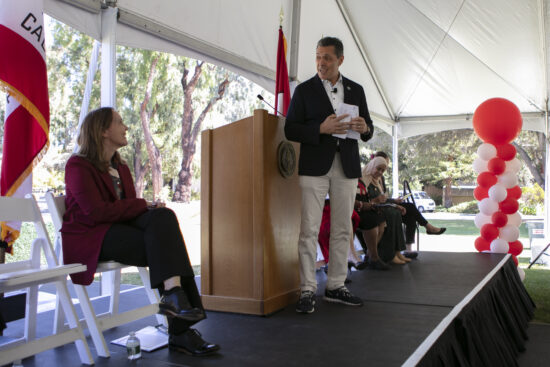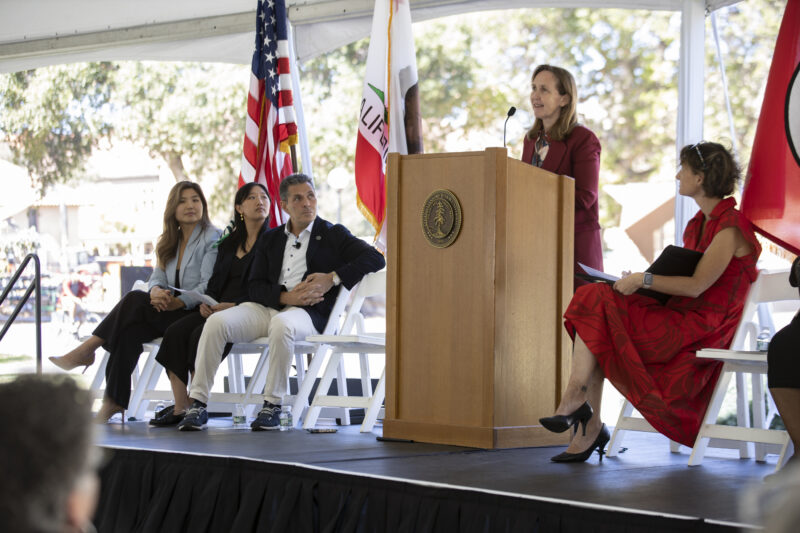Stanford Law School Community Celebrates the Start of the 2023-24 Academic Year
At Stanford Law School’s (SLS) fifth annual convocation, held September 26 on the lawn in front of the school, one theme dominated the ceremony marking the beginning of the 2023-24 academic year: Lawyers—and law students—have a critical role to play in promoting democracy, the rule of law, and stable, productive societies. And lawyers, to be effective, have to know how to communicate across differences, solve problems, and work with people who have differing views, explained keynote speaker Daniel Lubetzky, JD ’93, the Mexico City-born founder of healthy snack company, KIND Snacks.
‘The Oil that Makes the Machinery of Democracy Work’
Lubetzky is known for harnessing market forces to help overcome divisions between people on a global scale. In addition to Kind, a majority stake of which he sold to Mars in 2020 for $5 billion, Lubetzky has founded a number of companies focused on “peace through business” and nonprofits to promote liberal democracy and cultivate civil dialogue.
While a student at SLS, he said, he came up with the idea for PeaceWorks, a “not-only-for-profit” company that has brought together Israeli and Arab businesspeople on a joint venture involving the sale of Middle Eastern tapenades and sauces. Recently, he created Starts With Us, a civic movement empowering Americans to overcome toxic polarization.

“I became enthralled with the rule of law when I immigrated to the United States as a 16-year-old from Mexico and I discovered American democracy,” said Lubetzky, whose father survived the Dachau concentration camp as a teenager and was liberated by American soldiers. “For me, liberal democracy and the freedoms that come with it are magical. They are magical because they allow a society to thrive and make the most of our diversity of thoughts and backgrounds. I was drawn to law school as a place where I could develop the skills to safeguard the values and liberties that enable us to live together in harmony. Rule of law in liberal democracies is not only about justice and fairness. Our marketplace of ideas, with the freedoms to protect them and the kindness to debate them, allows the best ideas to rise while respecting the contributions of all who come to the debate.”
Lubetzky shared his idea that “kindness is the oil that lubricates the machinery of democracy,” explaining that his company was built on a foundation of respecting differences and open dialogue.
“A kind culture is a high functioning culture in which you don’t avoid tough conversations, you embrace them, trusting one another, assuming positive intent,” he said. “Stanford taught me to be a critical thinker, so that I do not blindly accept the dogma from ‘my side.’”
Lubetzky also encouraged SLS students to embrace the friendships and connections that they make during law school. “In the Stanford ethos, we are encouraged to compete with ourselves, rather than each other,” he said. “Make sure to forge bonds with your schoolmates to focus on becoming the best that you can be and to work hard while having a lot of fun.”
The Unique Role of the Law School

In her remarks, Jenny Martinez, the Richard E. Lang Professor of Law and Dean of Stanford Law School, underscored Lubetzky’s focus on the importance of sustaining democracy and the critical role law schools and lawyers play in that endeavor. She highlighted the diverse range of backgrounds, talents, and accomplishments of the 679-member SLS student body, noting that students come from almost every state in the United States and dozens of countries.
“As a law school, our mission is, in very crucial ways, devoted to sustaining democracy and the rule of law and that makes our educational endeavor different from some other kinds of study,” she said. “At the same time, like all educational institutions and all of Stanford, part of the experience here is also our growth as human beings, and that includes everything that takes place outside the classroom as well as inside the classroom, whether it is a hike at the Dish, volunteering in the community, or simply sitting around talking with friends and supporting one another through the ups and downs of life in the law school. The bonds that we form with each other here on campus are an essential part of the law school experience.”
Martinez encouraged students to use their time at SLS to start learning how to build bridges across differences. “What strikes me most about the way Daniel has chosen to live his life and use what he learned here on the Farm is his focus on bringing people together,” she said. “In a liberal democracy, law is the way we reconcile our most profound differences, law is the way we resolve disagreements, not with violence or mere power, but with reason, principle, and ideally humanity and compassion.”
Professor Julian Nyarko Wins the Barbara Allen Babcock Award

Martinez announced that Associate Professor Julian Nyarko was this year’s winner of the Barbara Allen Babcock Award for Excellence in Teaching, given in honor of the first woman on the SLS faculty, a “legendary scholar and teacher,” according to Martinez. Based on student feedback, the award is given to instructors in the 1L curriculum who promote “inclusion of learning, intellectual rigor and commitment to the highest standards of professional integrity, mentorship and service.”
“I love teaching 1Ls and love the excitement in their eyes–well, at least for the first few classes,” Nyarko said to laughter from the crowd.
Focus on Friendships, Not Just Classes
Stanford Law Association student speakers Helena Mao Li, JD ’25, and Jessica Shin, JD ’25 echoed Lubetzky’s and Martinez’s advice to students to build lifelong connections with their fellow students.

Li recounted her 1L year struggles, including her attempts to juggle coursework, a social life, and sleep, which led to fears that she wasn’t up to the rigors of Stanford Law School. “Your job while you’re here is not to get everything right,” Li said. “Your job is to learn something about yourself and learn something about the friends around you and make connections.”
Shin said she hoped the coming year would bring “a sense of community across the entire student body” and encouraged her fellow students to invest in their relationships. “These are the people that we will call up when we are pivoting from our third to fourth career change, when we are experiencing another life existential crisis, or just need occasional legal advice,” she said.
Beginnings and Endings
The ceremony began with an acknowledgment by Carson Olivia James Smith, JD ’25 (BA ’19) co-president of the Native American Law Students Association (NALSA) and a member of the Choctaw Nation of Oklahoma, that Stanford University sits on the ancestral land of the Muwekma Ohlone Tribe. Invocations were then offered by Dr. Amina Darwish, associate dean for religious and spiritual life and advisor for Muslim life, and Rev. Dr. Sakena Young-Scraggs, senior associate dean for religious and spiritual life and pastor of Memorial Church.
This was the final law school convocation for Martinez, who established the school’s tradition of marking the start of a new academic year in 2019, her first year as dean. On October 1, Martinez will assume the role of Stanford University Provost. Robert Weisberg, the Edwin E. Huddleson, Jr. Professor of Law and Associate Dean for curriculum at the law school, who will serve as interim dean, was also in attendance.
Rev. Dr. Tiffany Steinwert, dean for religious and spiritual life at Stanford University, offered a benediction to close the ceremony.
Following the ceremony, students, faculty, and staff attended a lunch marking the beginning of the academic year.

